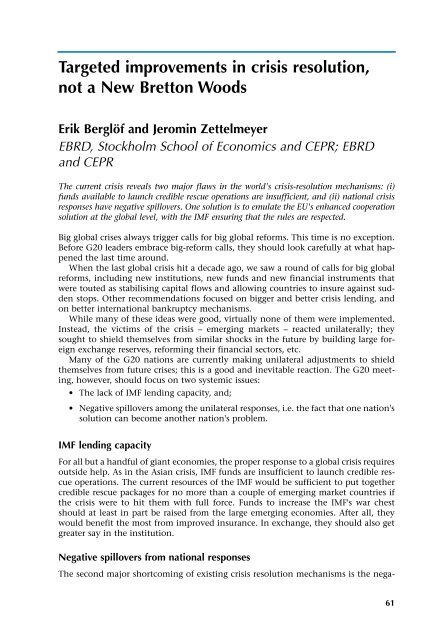What G20 Leaders Must Do To Stabilise our Economy and Fix ... - Vox
What G20 Leaders Must Do To Stabilise our Economy and Fix ... - Vox
What G20 Leaders Must Do To Stabilise our Economy and Fix ... - Vox
You also want an ePaper? Increase the reach of your titles
YUMPU automatically turns print PDFs into web optimized ePapers that Google loves.
Targeted improvements in crisis resolution,not a New Bretton WoodsErik Berglöf <strong>and</strong> Jeromin ZettelmeyerEBRD, Stockholm School of Economics <strong>and</strong> CEPR; EBRD<strong>and</strong> CEPRThe current crisis reveals two major flaws in the world's crisis-resolution mechanisms: (i)funds available to launch credible rescue operations are insufficient, <strong>and</strong> (ii) national crisisresponses have negative spillovers. One solution is to emulate the EU's enhanced cooperationsolution at the global level, with the IMF ensuring that the rules are respected.Big global crises always trigger calls for big global reforms. This time is no exception.Before <strong>G20</strong> leaders embrace big-reform calls, they should look carefully at what happenedthe last time around.When the last global crisis hit a decade ago, we saw a round of calls for big globalreforms, including new institutions, new funds <strong>and</strong> new financial instruments thatwere touted as stabilising capital flows <strong>and</strong> allowing countries to insure against suddenstops. Other recommendations focused on bigger <strong>and</strong> better crisis lending, <strong>and</strong>on better international bankruptcy mechanisms.While many of these ideas were good, virtually none of them were implemented.Instead, the victims of the crisis – emerging markets – reacted unilaterally; theysought to shield themselves from similar shocks in the future by building large foreignexchange reserves, reforming their financial sectors, etc.Many of the <strong>G20</strong> nations are currently making unilateral adjustments to shieldthemselves from future crises; this is a good <strong>and</strong> inevitable reaction. The <strong>G20</strong> meeting,however, should focus on two systemic issues:• The lack of IMF lending capacity, <strong>and</strong>;• Negative spillovers among the unilateral responses, i.e. the fact that one nation'ssolution can become another nation's problem.IMF lending capacityFor all but a h<strong>and</strong>ful of giant economies, the proper response to a global crisis requiresoutside help. As in the Asian crisis, IMF funds are insufficient to launch credible rescueoperations. The current res<strong>our</strong>ces of the IMF would be sufficient to put togethercredible rescue packages for no more than a couple of emerging market countries ifthe crisis were to hit them with full force. Funds to increase the IMF's war chestshould at least in part be raised from the large emerging economies. After all, theywould benefit the most from improved insurance. In exchange, they should also getgreater say in the institution.Negative spillovers from national responsesThe second major shortcoming of existing crisis resolution mechanisms is the nega-61














